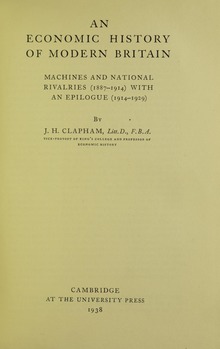John Harold Clapham
Sir John Harold Clapham , CBE , FBA (born September 13, 1873 in Salford , Lancashire - † March 29, 1946 ) was a British economic historian and university professor who established economic history as a separate field of study in the United Kingdom .
biography
The son of a jeweler and follower of the Wesleyan Church studied after school at The Leys School and King's College in Cambridge , which he graduated summa cum laude in history in 1895 . For his outstanding work, he received a Lightfoot Fellowship in Church History in 1896 and, after receiving the Prince Consort Prize in 1897, became a Fellow of King's College. During this time he was significantly influenced by Alfred Marshall , the most influential economist of his time.
In 1902 he began his professional career with an appointment as professor of economics at the University of Leeds , where he began his reputation as a pioneer in economic history. In 1908 he became dean of King's College and stayed with it as a tutor from 1913 to 1928 . In addition to this activity, he was a member of the Emergency Committee of the Board of Trade between 1916 and 1918 . He then became Commander of the British Empire in 1918 .
In 1928 he was appointed the first professor of economic history at Cambridge University and held this teaching post until 1938. His students included Hrothgar John Habakkuk . In the meantime, he was also Vice Provost of King's College from 1933 to 1943 . He was also President of the British Academy from 1940 until his death in 1946 . In addition, in 1941 he was editor of Studies in Economic History and the first volume of the epoch-making Cambridge Economic History of Europe .
For his services he was knighted as a Knight Bachelor in 1944 and from then on carried the suffix "Sir".
After the Second World War , in 1945 Prime Minister Clement Attlee appointed him chairman of the Committee for Economic Studies and Empirical Social Research . The recommendations made by this committee, which were published after Clapham's death, were accepted and implemented by the government.
Views and publications
In addition to his teaching activities, he wrote numerous specialist books. Many of his writings were shaped by the fact that he was largely disinterested in the role of ideas and, in his famous 1922 essay Of Empty Boxes, attacked the theory and analysis of outdated reviews.
During the 1930s and 1940s , when there was disagreement of method and meaning among historians and social scientists , he continued to support the history of institutions on collections of economic data. In his monumental three-volume Economic History of Modern Britain , published between 1926 and 1938, he traced back with admiration the achievements of free enterprise in the 19th century .
Although he had a personal understanding of the economically disadvantaged, he wrote little about them and even less about the causes of their disadvantage. His views on economic history as the "story of how men have kept alive and as comfortable as might be" dominated the practice of economic history at Cambridge University to the present more recent times.
His major publications include:
- The Causes of the War of 1792 (1889)
- The Woolen and Worsted Industries (1907)
- The Abbé Sieyès : An Essay in the Politics of the French Revolution (1912)
- The Economic Development of France and Germany, 1815-1914 (1921)
- An Economic History of Modern Britain , 3 volumes (1926–38)
- The Bank of England , A History , ISBN 0-521-04662-9 (1944)
- A Concise Economic History of Britain, from the Earliest Times to 1750 (1949)
The quote “Economic advance is not the same thing as human progress” also came from him (economic progress is not the same as human progress).
Web links
- Sir John Harold Clapham (UXL Encyclopedia of World Biography, (2003))
- ENCYCLOPEDIA.COM
- Papers Relating to Sir John Harold Clapham
Individual evidence
- ↑ Knights and Dames at Leigh Rayment's Peerage
- ↑ Books by John Harold Clapham
- ^ John Harold Clapham: The Woolen and Worsted Industries . General Books LLC, 2009, ISBN 978-1-150-19358-3 (English, limited preview in Google Book Search).
| personal data | |
|---|---|
| SURNAME | Clapham, John Harold |
| ALTERNATIVE NAMES | Clapham, Sir John Harold (full name) |
| BRIEF DESCRIPTION | English economic historian |
| DATE OF BIRTH | September 13, 1873 |
| PLACE OF BIRTH | Salford , Lancashire |
| DATE OF DEATH | March 29, 1946 |
